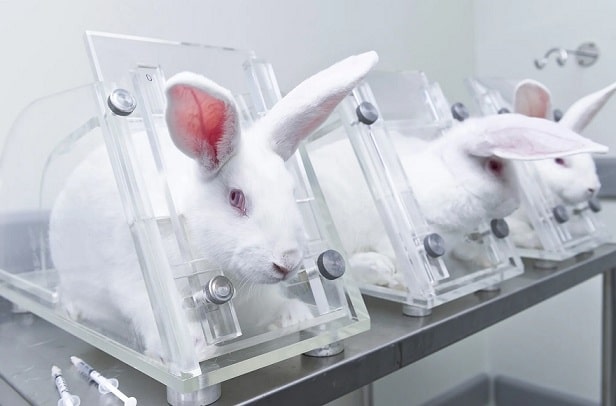نمونه سوالات اسپیکینگ آیلتس درباره آزمایش بر روی حیوانات (پارت 1 2 3)
در این بخش بیش از 20 مورد از نمونه سوالات اسپیکینگ آیلتس نمره 9 درباره “موضوع آزمایش بر روی حیوانات” را با هم میبینیم. این مجموعه از آخرین سوالات گزارش شده از سنترهای برگزار کننده آیلتس در ایران و خارج از کشور مربوط به پارت 1، 2 و 3 می باشند و شانس تکرار آن ها در آینده بالاست. در ادامه مطلب همچنین نکات گرامری، لغات و دلایل دریافت نمره 9 را به طور مشخص توضیح داده ایم تا راهنمایی برای علاقمندان باشد. 1000 نمونه سوالات اسپیکینگ آیلتس با جواب PDF پارت 1 2 3 پیشنهاد بعدی ما به شما عزیزان است.
نمونه سوالات اسپیکینگ آیلتس درباره موضوع آزمایش بر روی حیوانات (پارت 1)
Do you think animal testing is necessary for scientific research?
Animal testing plays a crucial role in scientific research, particularly in the fields of medicine and pharmacology. It allows researchers to understand the effects of new drugs and treatments before they are used in humans. While alternatives are being developed, such as in vitro testing and computer simulations, animal testing remains essential for ensuring safety and efficacy. It’s important to find a balance between scientific progress and ethical considerations, ensuring that animals are treated humanely during the research process.
How do people in your country feel about animal testing?
In my country, opinions on animal testing are quite polarized. Many people support it, believing it is necessary for medical advancements and human safety. However, a significant portion of the population opposes it, advocating for animal rights and promoting alternative research methods. Public awareness campaigns have helped educate people about the ethical issues involved, leading to an increased demand for more humane research practices. Overall, the conversation around animal testing is evolving as society seeks to balance scientific progress with compassion for animals.
Have you ever seen any campaigns against animal testing?
Yes, I have encountered several campaigns against animal testing, both online and in my community. These campaigns often feature powerful imagery and personal stories that highlight the suffering of animals used in experiments. Organizations like PETA and the Humane Society actively promote alternatives to animal testing and raise awareness about the ethical concerns. Social media has been instrumental in spreading these messages, and many people are becoming more vocal in their opposition to animal testing as a result of these efforts.
What alternatives to animal testing do you know?
There are several promising alternatives to animal testing that researchers are exploring. In vitro testing uses human cells and tissues to study drug effects and toxicity, which can be more relevant than animal models. Computer simulations and predictive modeling can also provide valuable insights into how substances interact with human biology. Additionally, advancements in stem cell research allow scientists to create human organoids, offering a more accurate representation of human responses. These alternatives are gaining traction, reducing the reliance on animal testing over time.
Do you think people are well-informed about animal testing?
While some individuals are well-informed about animal testing, many people lack comprehensive knowledge of the subject. Awareness campaigns and educational programs are helping to bridge this gap, but misconceptions still exist. Some people may not fully understand the necessity of animal testing for medical advancements, while others might not be aware of the ethical implications involved. Increasing public awareness through discussions and educational initiatives can help create a more informed society that can engage in meaningful debates about animal testing and its alternatives.
What do you think is the future of animal testing?
The future of animal testing is likely to involve a shift toward more humane and scientifically advanced methods. As technology continues to evolve, researchers are finding innovative alternatives that reduce the need for animal subjects. Advances in genomics, bioinformatics, and organ-on-a-chip technology are paving the way for more ethical research practices. While animal testing may not disappear entirely, its role will likely diminish as society prioritizes both scientific progress and animal welfare in the years to come.
How does animal testing impact scientific advancements?
Animal testing has significantly impacted scientific advancements by enabling the development of life-saving treatments and drugs. It has played a pivotal role in understanding complex biological systems and disease mechanisms. Many medical breakthroughs, such as vaccines and cancer therapies, have relied on animal research to ensure safety and efficacy before moving to human trials. However, the scientific community is increasingly recognizing the need for complementary approaches that minimize animal use while still advancing knowledge and innovation.
What is your opinion on cosmetic testing on animals?
I believe that cosmetic testing on animals is unnecessary and unethical. With the availability of alternative testing methods, such as in vitro assays and computer modeling, there is no justification for subjecting animals to painful and often lethal experiments for cosmetic products. Consumers are becoming more aware of the issue, leading to a growing demand for cruelty-free products. It is crucial for companies to adopt ethical practices and prioritize the welfare of animals while still delivering safe and effective cosmetics to the market.
Have you ever participated in any animal rights activities?
Yes, I have participated in several animal rights activities, including awareness campaigns and fundraising events for organizations that promote humane treatment of animals. These experiences have opened my eyes to the challenges faced by animals in research and the importance of advocating for their rights. Engaging in discussions and supporting initiatives that aim to reduce animal testing has been a rewarding experience. It is essential to contribute to the movement that seeks to create a more compassionate world for all living beings.
What role do you think education plays in the debate about animal testing?
Education plays a vital role in the debate about animal testing by providing individuals with the knowledge needed to form informed opinions. Understanding the scientific, ethical, and legal aspects of animal testing is essential for engaging in meaningful discussions. Educational initiatives can help dispel myths and misconceptions while promoting awareness of alternative methods. By fostering a well-informed public, education empowers individuals to advocate for humane practices and contribute to a more compassionate approach to scientific research.
نمونه سوالات اسپیکینگ آیلتس درباره موضوع آزمایش بر روی حیوانات (پارت 2)
Describe a controversial topic related to science or ethics that you have thought about. You should say:
What the topic is
Why it is controversial
What your opinion on the topic is
And explain why you think this topic is important to discuss.
Band 9 Answer:
One controversial topic that I have thought about deeply is the use of animals in scientific experiments. This issue has sparked significant debate globally, as it sits at the intersection of scientific progress, ethics, and animal rights. The controversy arises because, on one hand, animal testing has contributed to major medical breakthroughs, such as the development of vaccines, antibiotics, and treatments for diseases like cancer. On the other hand, it raises serious ethical concerns about the treatment of animals and whether it is morally justifiable to subject them to pain and suffering for human benefit.
Personally, I find this topic particularly important because it forces us to weigh the benefits of scientific advancement against the moral responsibility we have toward other living beings. While I acknowledge the critical role animal testing has played in saving human lives, I also believe that we must strive to find alternatives that minimize harm to animals. For example, advancements in technology, such as computer modeling and in vitro testing, offer promising alternatives that could eventually replace the need for animal experiments altogether.
The ethical implications of this topic are profound. Many argue that animals, like humans, are sentient beings capable of experiencing pain and fear, and therefore, they deserve to be treated with compassion and respect. Organizations like PETA and the Humane Society have been vocal advocates for ending animal testing, pushing for stricter regulations and greater transparency in scientific research. At the same time, scientists and researchers often emphasize that animal testing remains necessary for ensuring the safety and efficacy of new drugs and treatments, especially in the absence of equally reliable alternatives.
I believe this topic is crucial to discuss because it challenges us to reflect on our values and priorities as a society. It encourages us to find a balance between advancing human health and respecting the rights of animals. Moreover, it highlights the need for continued innovation in science to develop ethical and effective research methods. By engaging in this debate, we can work toward a future where scientific progress does not come at the expense of animal welfare. Ultimately, this topic reminds us of our responsibility to act with empathy and integrity, not only toward humans but toward all living creatures.

نمونه سوالات اسپیکینگ آیلتس درباره موضوع آزمایش بر روی حیوانات (پارت 3)
Why do you think some scientists support animal testing?
Many scientists support animal testing because it has historically provided critical insights into biological processes and disease mechanisms. Animal models can mimic human physiology, allowing researchers to assess the safety and efficacy of new treatments before moving to human trials. Despite ethical concerns, proponents argue that animal testing is a necessary step in ensuring the well-being of humans. They believe that it enables the discovery of life-saving medications and therapies that would be difficult to achieve without using animal models.
What ethical concerns are associated with animal testing?
Ethical concerns surrounding animal testing primarily revolve around animal welfare and the potential suffering inflicted on test subjects. Critics argue that subjecting animals to experiments can cause pain, distress, and long-lasting harm. Additionally, questions arise regarding the moral justification of using sentient beings for human benefit. These ethical dilemmas have led to increased advocacy for alternative methods that prioritize animal welfare while still facilitating scientific research. Balancing scientific advancement with ethical considerations is crucial for fostering a compassionate approach to research.
How has public opinion on animal testing changed in recent years?
Public opinion on animal testing has shifted significantly in recent years, with growing awareness of animal rights and ethical considerations. More people are advocating for alternative testing methods and questioning the necessity of animal experiments. Campaigns highlighting the suffering of animals have gained traction, influencing consumer choices and prompting companies to adopt cruelty-free practices. This change in sentiment reflects a broader societal trend towards compassion and ethical responsibility, as individuals increasingly recognize the importance of considering animal welfare in scientific research.
What role do regulations play in animal testing?
Regulations play a crucial role in animal testing by establishing ethical guidelines and ensuring that research is conducted responsibly. These regulations aim to minimize animal suffering, promote humane treatment, and encourage the use of alternatives whenever possible. Regulatory bodies assess the necessity of animal testing and require researchers to justify their use of animals in experiments. By implementing stringent standards, regulations help protect animal welfare while allowing scientists to conduct necessary research in a responsible manner.
Do you think the benefits of animal testing outweigh the ethical concerns?
The debate over whether the benefits of animal testing outweigh the ethical concerns is complex and subjective. Some argue that the medical advancements achieved through animal research justify the ethical dilemmas, as many life-saving treatments rely on animal testing for safety and efficacy. However, others contend that the suffering of animals cannot be justified by human benefit, advocating for alternative methods that do not involve animals. Ultimately, finding a balance between scientific progress and ethical considerations is essential for fostering a compassionate approach to research.
What impact does social media have on animal rights activism?
Social media has had a profound impact on animal rights activism by providing a platform for raising awareness and mobilizing support. Activists can share information, personal stories, and campaigns to reach a wider audience, fostering public discourse on animal testing and welfare. Viral campaigns have led to increased scrutiny of companies that engage in animal testing, prompting many to adopt cruelty-free practices. Additionally, social media allows for the organization of events and petitions, making it easier for individuals to engage in advocacy and contribute to the movement for animal rights.
How can society find a balance between scientific advancement and animal welfare?
Finding a balance between scientific advancement and animal welfare requires a collaborative approach involving scientists, ethicists, and policymakers. Emphasizing the development and adoption of alternative testing methods can help reduce reliance on animal testing while still facilitating necessary research. Public awareness campaigns can educate individuals about the importance of humane practices in science, fostering a culture of compassion. Moreover, encouraging transparency in research practices and promoting ethical standards will enable society to prioritize both scientific progress and animal welfare.
What are some of the challenges faced in replacing animal testing with alternatives?
One significant challenge in replacing animal testing with alternatives is the complexity of biological systems. Animal models can provide valuable insights into the interactions of various physiological processes that are often difficult to replicate in vitro. Additionally, regulatory hurdles may hinder the acceptance of alternative methods, as regulatory agencies require extensive validation to ensure their reliability. Funding and resources for developing alternatives can also be limited, slowing the transition away from animal testing. Addressing these challenges is crucial for advancing humane research practices.
In your opinion, should cosmetic companies use animal testing?
In my opinion, cosmetic companies should not use animal testing, as there are numerous alternative methods available for ensuring product safety. With the rise of in vitro testing and advanced computer modeling, it is unnecessary and unethical to subject animals to harmful experiments for cosmetic products. The growing consumer demand for cruelty-free cosmetics reflects a societal shift towards more ethical practices. Companies should prioritize the welfare of animals while still delivering safe and effective products, demonstrating a commitment to responsible and humane practices.
What do you think is the most effective way to advocate for animal rights?
The most effective way to advocate for animal rights is through education and awareness. By informing individuals about the ethical implications of animal testing and the availability of alternatives, advocates can foster informed discussions and promote compassionate practices. Social media campaigns, community events, and collaboration with organizations dedicated to animal welfare can amplify the message and engage a wider audience. Ultimately, encouraging individuals to make conscious choices and support cruelty-free initiatives can drive meaningful change in society.
عوامل مؤثر در کسب نمره ۹ در پاسخها
دستیابی به نمره 9 در بخش گفتاری آیلتس نیازمند ترکیبی از روانی، انسجام، منبع واژگانی، دامنه و دقت گرامری است. در اینجا به چگونگی تحقق این معیارها در پاسخهای فوق پرداخته شده است:
روانی و انسجام: پاسخ سوالات اسپیکینگ موضوع آزمایش بر روی حیوانات بهطور منطقی سازماندهی شدهاند، با جملات موضوعی واضح و جزئیات پشتیبان. ایدهها بهطور کامل و منطقی توسعه داده شدهاند و این امر باعث میشود که داور به راحتی بتواند افکار گوینده را دنبال کند.
منبع واژگانی: دامنه وسیعی از واژگان استفاده شده است، از جمله اصطلاحات خاص مربوط به آزمایش بر روی حیوانات (مانند “آزمایش درونزا”، “ملاحظات اخلاقی”، “موجودات حسی”). زبان دقیق و متنوع است که کیفیت پاسخها را افزایش میدهد.
دامنه و دقت گرامری: پاسخ سوالات اسپیکینگ موضوع آزمایش بر روی حیوانات از انواع ساختارهای گرامری استفاده میکنند، از جمله جملات پیچیده، جملات شرطی و حالت مجهول. هیچ گونه خطای گرامری وجود ندارد که نشاندهنده کنترل بالا بر زبان باشد.
تلفظ و لحن: اگرچه بهطور صریح نوشته نشده است، مهم است که به یاد داشته باشید که روانی در گفتار همچنین به تلفظ و لحن بستگی دارد که باید در پاسخهای نمره 9 واضح و طبیعی باشد.
درگیر شدن با موضوع: هر پاسخ منعکسکننده درگیری فکری عمیق با موضوع است و بینشها، نظرات و مثالهای شخصی را نشان میدهد. این عمق فکر از ویژگیهای یک داوطلب با نمره بالا است.
با حفظ استاندارد بالا در این زمینهها، داوطلبان میتوانند ایدهها و استدلالهای خود را بهطور مؤثر بیان کنند و در نتیجه نمره بالایی در آزمون گفتاری آیلتس کسب کنند.
تعیین سطح رایگان اسپیکینگ ❤️
نمونه سوالات اسپیکینگ آیلتس درباره “موضوع آزمایش بر روی حیوانات” پارت 1 2 3 را به همراه سمپل های نمره 9 آن ها با هم دیدیم. در ادامه نمونه سوالات دسته بندی شده اسپیکینگ آیلتس پیشنهاد آخر ما به دوستان گرامی هست. این نمونه سوالات اسپکینگ از پرتکرار ترین تاپیک های این بخش و همچنین جدیدترین موضوعات می باشند. این مجموعه توسط یکی از سایت های معتبر و فعال آیلتس تنظیم شده است. همچنین برای تعیین سطح و تعیین رایگان نمره اسپیکینگ و دریافت جدید ترین سمپل های نمره 9 در کانال تلگرام اسپیکینگ ما همراه باشید و به ادمین برای تعیین نمره اطلاع دهید.





